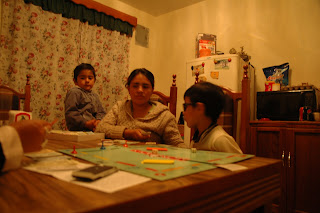Disparity of wealth is visible in Guatemala in many very obvious and tangible ways. In the municipality where I live and work it often correlates with race (Spanish or indigenous descent) and location (urban or rural). The reality of my current situation is that the town center, where most of the necessary basic services- the market, the health center, the municipal offices, are located is populated by the 2% of the population that is Ladino, or of Spanish descent. The outlying rural areas, where there are much higher rates of poverty and malnutrition, is where rest of the 98% of municipal citizens live, a sweeping majority of them of indigenous descent.
This disparity in my own town was almost sickeningly obvious to me a few weeks ago when I was invited to the first birthday party of a friend's child. There were over 100 guests present at the party, all of them well dressed and groomed, bearing presents wrapped in brightly colored paper. The party had clowns, pinatas, and an abundance of foods; it went on for hours. Meanwhile outside, a small hoarde of uninvited children watched the whole thing through dirty glass. Of course, not every child could have been invited, but the selection of who was and who wasn't, seemed less based on who was friends and more on socioeconomic status.
I was invited, though, and struggled with the implications of that. The party-throwers are my friends. The kids outside are my neighbors and impromptu playmates. So what am I supposed to do? I can play the outsider card, pretend I'm clueless and be friends with everyone. Or I can speak my mind, and loose friends and trust. It's a hard thing, at times, being an outsider in a new context, the very nature of our lives and jobs to analyze situations like this one that we see in our towns. So what do we do? I honestly, don't know.













